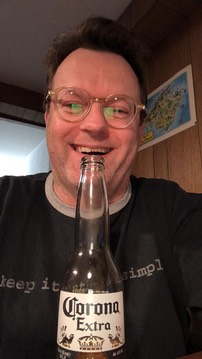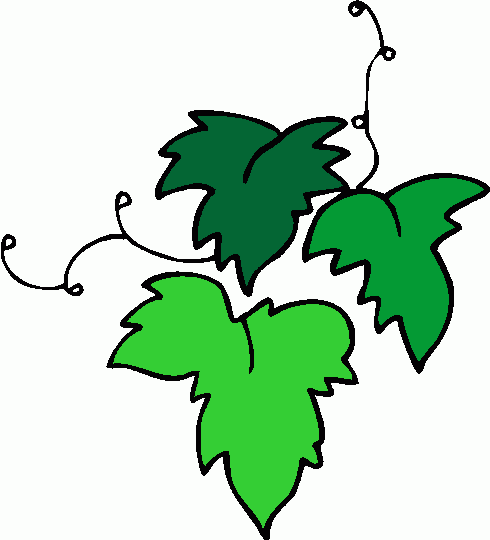Ex-Local Dad (he now lives in Germany) Nick Zea-Smith is blogging for us about life under lockdown with his wife and four kids. It’s end of the school year, beginning of summer and lashings of ice-cream is the order of the day
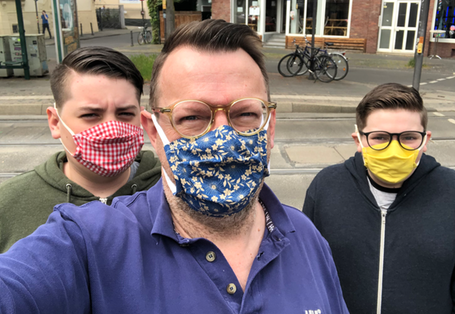
July
It’s been a couple of weeks since I last had some time to sit in front of a
keyboard and write a few words. I normally conjure up an idea on a Tuesday or
Wednesday, then put finger to laptop on Thursday, with the “splash” ready for
midday.
The routine will be familiar to any regional newspaper correspondent, columnist
or vLogger, but as Douglas Adams used to say, “I
love deadlines. I like the whooshing sound they make as they fly by.”
In between the end of term programme for our youngest, which-school-day-are-you roulette on top of all the usual stuff we do in a week, it’s been pretty
hectic. The result has been very little time to sit in front of a keyboard.
End of summer term usually has a karnival atmosphere, with a school and class
celebration, where school leaving certificates are handed out to children,
along with school prizes for achievement, sport and behaviour.
It culminates in a BBQ held in the school grounds, which usually ends in a
parents, friends and teachers vs children football, basketball or rugby match.
Rules are ‘honoured’ rather than followed and it is a huge amount of fun. It’s
not uncommon to see Mums, Dads and grandparents, lining up against each other. The
last one we attended involved around 35 participants with parents ‘tagged’, but
while it was ‘friendly’ I still managed to end up hobbling for a few days
afterwards. It’s old age. And yes, I declined to take part in the penalty
shoot-out…
This year was very different. A few days before the end of the year, teachers
organised Zoom calls with their classes to explain what was going to happen and
how report cards would be issued.
I sympathise with all of the staff as they tried their best in difficult
circumstances to make the final day of primary school special for those
transitioning to high school. A class video produced by parents including short
messages for their teacher, and report cards were gently handed out on a
class-by-class basis by the headteacher under the trees in the school garden.
Instead of a dance-party and BBQ that last day was more sombre, but also
special. The school organsied for the village Italian Eis parlour to bring the
ice-cream truck to the school, so children – and teachers – could enjoy the
sunshine and a relaxed farewell. Sadly, parents and friends weren’t allowed.
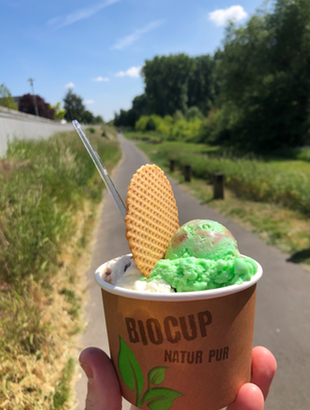
Eis scream, Du Scream, Everyone Wants
After bier and wurst, the third passion in Germany is Eis. And it has to be
Italian. No matter where you are, even in the depth of winter, you’ll see
people wandering around in their lunchtime, or at the weekend with an ice cream
cone or waffle. It’s a way of life.
Rich and creamy, the variety of locally made ice-cream at your village Eis
parlour and Cafe is breath-taking. After six years, I still don’t think I’ve
tasted every flavour they have available, but it’s fun trying.
Using locally sourced bio ingredients and generations-old recipes, the Eis
parlour and its owner, Georgio, is something of a legend in our area. From his
love of local football to village events such as the Christmas market, he is
one of the first to help, or volunteer for anything.
And the most
prized possession for every child in the village at Christmas and the end of
summer term is a voucher for three free scoops of eis over the holiday.
Parents on the other hand benefit from one of his magical espressos which are
guaranteed to wake you up and reconnect the hardwiring and nerve endings. German
coffee is a story for another day…!
Stay safe, healthy and keep smiling.
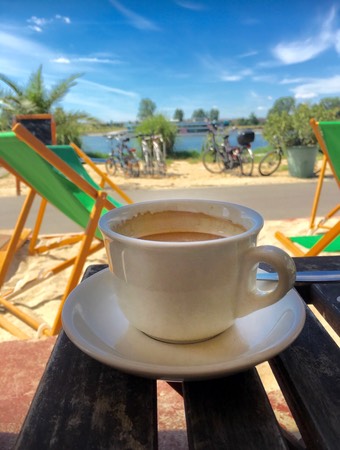
A coffee with a friend on the Rhein in Bonn, but face masks aren’t required
June
I’m sure everyone has heard someone use the phrase ‘new normal’ either on TV or radio or in passing conversation. It’s marketing-speak for the changes taking place in our work, school and social lives, from wearing face masks in public, eating well and exercising to standing 2.0 metres apart in shopping queues.
What's interesting is how our post-lockdown daily lives here in Germany are evolving to fulfil needs and legal requirements. I met up with a friend for my first Friday drinks since Feb and we discussed this a little. That is after we’d left our email address on a form with the open-air bar owner so we can be contacted if there is a COVID outbreak traced to the venue.
While it was great sitting by the Rhein in Bonn, watching the small number of commuters heading home after work, friends meeting up for the first time in weeks, and university students gather to swap notes and exchange ideas, it all felt a bit big brother.
There were no brisk handshakes, less laughter, behaviour was more muted than normal and the atmosphere felt slightly sinister. I’m sure this will change as we all get used to the new way of life. The waiter explaining to one customer that it was okay to remove their mask so they could drink their Kolsch and didn’t need a straw was a great example. No laughing, just lots of understanding nods all round by patrons.
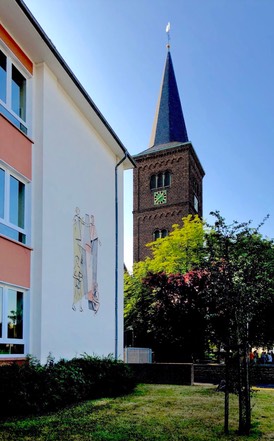
School life is getting back to something that looks like normal
Kinder Surprise
Lockdown Marcomms Mum and I discussed the very real changes and our new normal over a rare G&T on the terrace this week, and how it extends to everything from a letter arriving at home to behaviour of children and their new teaching environment in the classroom.
Let us explain. Germany is a little further ahead on lockdown than the UK and children are back in rotated classrooms, more or less full-time.
Our youngest attends the small village school and has a few short weeks of her last year left, before moving to high school. Classes have been divided into small groups of no more than 15 children. The school day is just 3.5 hours long once or twice a week, and year groups are on rotation. Doors open at the exact time rather than the usual half an hour early so they can play in the school yard.
Children assemble behind a yellow line in the playground and are spaced 2m apart, before being let in one at a time to the building according to the daily register. Children must walk straight to their classroom without stopping.
Classroom desks are spaced 2.0 metres apart, and each child goes to an assigned seat where they remain and cannot stand up unless given permission by their teacher. Breaks happen on a class-by-class basis and while children are not forced to wear masks, teachers do.
A similar system is in place for our two older teenage boys who attend the village senior school for 3.5 hours, two days a week. They are expected to be sat at desks 15 minutes before class starts and wear masks inside all the time, although they can remove them when seated at their desks.
Whereas children walked to different classrooms for various classes, new normal sees teachers change classrooms. School rules expect children to sit nicely in seats between classes, but while all German children are kinder and obey most instructions, we somehow doubt that happens.
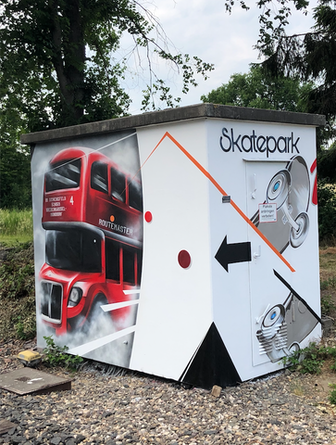
Our village after school club opened this week for distance learning... on an old London Transport Routemaster that used to drive where we lived
Car Farts
Minty, our much loved minivan passed it’s German MOT, which isn’t bad for a car that’s travelled approximately five times around the world and visited more countries in Europe than a rock band. The mechanic was a little surprised but wished me a “gute Fahrt” (good ride) with her. Our luck ran out though as the weather, which has been utterly brilliant until this week, changed so our plan for a trip to the Eiffel with her is on hold until the weather is a little better.
May 25
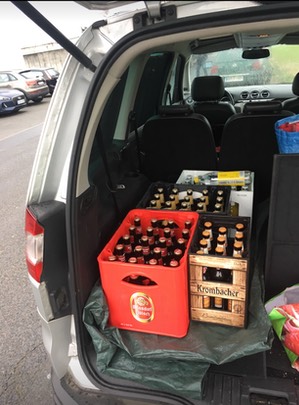
I told my wife I needed the AA. "For the car or yourself..?”
I’m sitting at my desk looking out at the garden. The salad box in the distance is yielding vast quantities of green veg, four rogue potato plants have appeared, and spinach is beginning to establish itself.
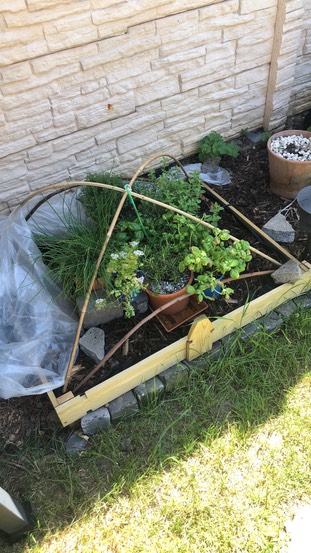
Herbs thriving, garden growing
Our cold frame, affectionately known as Colditz, is now a thriving mini herb garden, and baby tomato plants are looking good. It smells wonderful as the rosemary and thyme wake your senses. All we need is to grow mozzarella and we have a pizza factory.
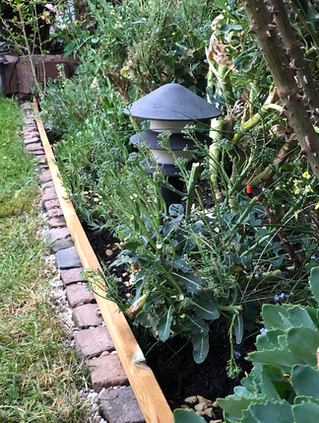
Hard work pays off when you pause in a garden at the end of a day
It’s almost like summer has arrived on the banks of the Rhein. Almost. We’re probably like most folks right now. Each evening, we try to snatch a few precious moments together on the terrace, spending time working out our day, schedule and gather our thoughts. It’s the only constant in our lives right now, and rather enjoyable.
Eis, Eis Baby
This week, it’s either been mid 20’s and sunny or verging on snow, but at least
the Italian Eis parlour is open. We were lucky to enjoy local freshly made dark
creamy chocolate ice cream on Father’s Day, which falls on a Thursday. Traditionally,
sons load up the family handcart with beer, then take Dad on a long hike. Dad
gets a ride back home while offering words of ‘wisdom’ to those in front. The
tradition has stuck in many parts of Germany, but now all children get
involved.
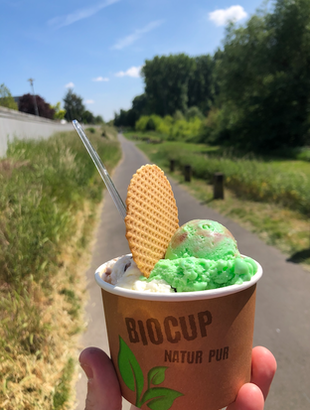
Homemade Eis from the village Italian cafe
It stems from the end of the first phase of Spring planting season on
farms but evolved over the years from an inspection of the work, to something
more enjoyable. It’s fun to see, but I’m not sure it was originally accompanied
by loud Euro-pop music played at full volume.
Mind the Gap
The biggest issue right now is working out what the day and date is as May and
June are always a little strange in Germany, thanks to four public holidays.
The confusion is because they aren’t celebrated by every state – Lutheran and
Catholic. Guessing who is in school or office takes some doing. And you must
make sure you’ve been shopping as some fall on a Saturday.
We’ve fallen foul of this once or twice, ended up getting takeout, then shopping on a Monday. Fortunately, my office manager has these highlighted in the calendar and announces them a few days in advance so I’m aware. As they tend to fall on Thursdays, most people arrange vacation Brückentag or bridge day tagged onto public holiday, so there’s an additional game of ‘who’s in or out?’ when you visit offices. They’re great, but on top of COVID work/school from home, it doesn’t help to guess days of the week and can upset the natural rhythm of life more than normal.
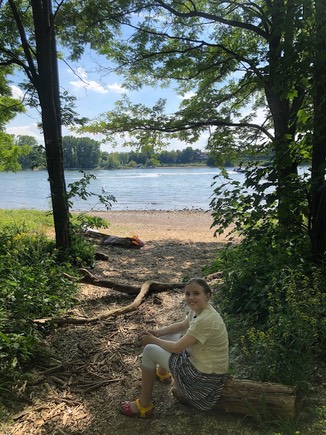
Sunny Father’s Day by the Rhein after eis. This is a 5-minute walk from our house
In a Fix
One of my ‘to do’ jobs has been to organise some much-needed repairs for our
second car. With garages opening again, I thought I’d get a quick ‘bring it
over’ reply. After four days of calling local garages, I’m of the opinion
mechanics are the new builders when it comes to reliability.
German efficiency is a myth. At times it can be as chaotic as southern Europe,
masked by a trail of paperwork. I was surprised by the response as with most small
businesses needing stimulus after the COVID break, I thought they’d be champing
at the bit for custom, but apparently not. If I haven’t heard from or found someone by
the middle of next week, I may do the job myself.
Good mechanics are hard to find and they’re precise – especially when it comes to TUV time (MOT). The car was failed a few years ago for a missing plastic clip on the underside of the bodywork. It wasn’t safety related, but the 55c part cost €230 to fit. I argued the bill as it was a three-minute job and got some discount, but this time, the same garage is open and is ‘calling you back’… Speaking with friends, they’ve recently experienced the same issue with everyone from mechanics to home computing IT technicians. Maybe Germany is changing a little in these new enlightened times.
The next week sees more children returning to school, residents being allowed to travel long distance and borders re-opening. It’s a brave new world. With the new changes in place I’m hoping to enjoy some spring sunshine and go Schloss hopping for a few days in the Eifel National Park, something I planned to do in February.
The plan is to explore and do a ‘rough guide’ to one of the least visited national parks in Europe. After 11 or so weeks at home it presents new challenges. We’ll see what they bring, but in the meantime, stay safe and healthy and don’t forget to smile.
May 18
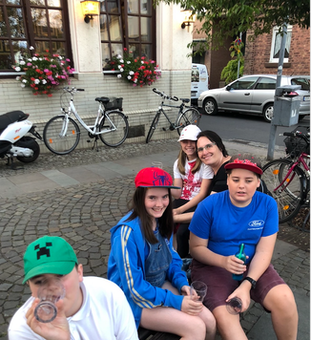
So how was your week? Organised? Calm? Or like a fight scene in a spaghetti
western? Ours has been a combination of all three. There have been moments of serene
calm interspersed with afternoons that felt like I’d stepped into the middle of
a boxing ring with three heavyweights.
Schools started to go back to teaching in classrooms, but being Germany, it’s
done in an ‘efficient’ manner, so children stay 2.0-metres apart, and get rotated
lesson time.
Everything is communicated by weekly email from the schools, which is great. If
you’re completely fluent in bureaucratic German. And even the Germans
themselves get it wrong. It’s like old English, but every seventh word is a
compound phrase where four words are joined together.
A refrigerator is a Kühlschrank (cool cupboard), Lastkraftwagen is a truck and
your local city representatives can be found in the aptly named rathaus, or
town hall. If you are Nahrungsmittelunverträglichkeit, you’re food intolerant,
while if you’re the Donaudampfschiffahrtselektrizitätenhauptbetriebswerkbauunterbeamtengesellschaft,
it means you carry the world’s biggest business card as the association for
subordinate officials of the head office management of the Danube
steamboat electrical services. Most of these long words are reduced to
three-letter acronyms which you must know by heart if you are to survive each
day…
While most places
would have sent a coloured chart showing days your child is required in school,
we got a long message of instructions. With four children at three different
schools, it takes hours to translate messages, interpreting them, working out
what they need in a school bag etc, then planning it into our weekly schedule.
I’m sure explaining complex chess strategies is probably easier. In Russian.
Monday saw us pack our youngest off to the village school and an early start,
only for her to return 45 minutes later saying, “wrong day, I’m in tomorrow”.
Tuesday all went well, and it was “the best school day ever”.
We double-checked the email and settled in for three more days of home-schooling,
only to be rudely disturbed by the school on Thursday asking whether our
daughter was joining them today. “Sure, we’ll send her”. Five minutes later, they
called back apologising to say “sorry, can she come along tomorrow? We got it
wrong”.
Why does this happen? There’s a worldwide myth that Germany is an efficient
place, but it couldn’t be further from the truth. It’s more a process driven
society. You follow the process, even when it’s daft as a brush, then blame the
paperwork when it all goes wrong.
Basically, it’s how you interpret what’s written down and how you follow the
instruction. The most used phrase you hear in everyday German is “was ist
möglich”, or “what’s possible..?” Our boys go back to school this week, and I
think we’ll be using this phrase once or twice more in the coming days.
On Yer Bike
The streets of Bonn, our nearest big city, are
filling up again. Slowly. Authorities set up a series of monitoring stations
around shopping areas and on bike paths to see how many people are in the city,
and figures suggest life is starting to return to normal.
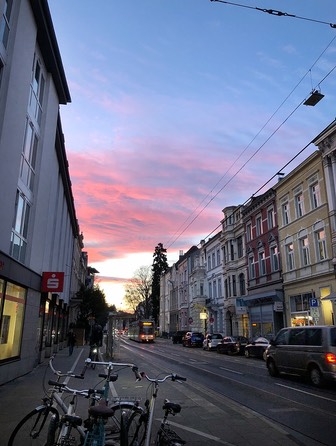
Bonn slowly wakes from the pandemic with locals switching from buses and trams to bikes
In the main shopping district, similar to London’s Oxford St, visitors peaked
at 1,850 people between 4 and 5pm, compared to a usual of around 2,380 pedestrians.
Before lockdown, there were something like 188,000 visitors, while in the first
week of May 116,250 visitors were counted.
One of the biggest things to change is how Bonners get around the city and
local area. Keen to avoid buses and public transport, people have moved from
four wheels to two, and it appears to be a trend that may continue long-term.
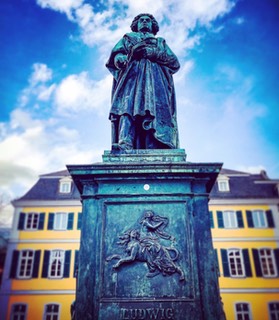
Bonn’s guardian of the city, Ludwig. He is 250 years old in 2020, while this statue has survived the Spanish flu and the battle for the city in WW2.
Bike lanes on the main bridge over the Rhein into the city, Kennedy Brücke, has
seen cycle numbers steadily increase since March, despite the pandemic. Isolation
exercisers, key workers and daily rides rose from 24,690
cyclists to 58,523 users last week (same period last year: 48,415).
Bonn’s Mayor has commented that he thinks long-term, this will be one of the
city’s biggest changes along with more home working. We’ll see what happens. I
never rode my bike in London as I viewed it as a mad place to be, but it’s
rather more enjoyable here, as cycle lanes and car lanes are more or less
isolated, the network is better and road users tend to be more aware or novice
riders like me.
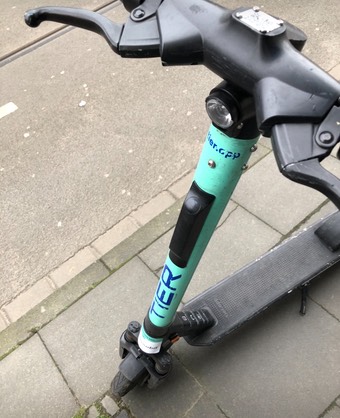
Tier e-scooters are one of the best ways to get around German city centers such as Bonn
Once or twice I’ve Limed, juiced or Tiered across the city for appointments and love zipping around on one of those pay-as-you-go e-scooters. They tend to be carefully parked in designated areas and readily available. In future, I’m going to use them more as they offer a freedom to go places cars can’t and are a blast to ride.
Change
Management
With some factories and businesses re-opening this week, I’m wondering what
will happen next here in Germany. The ministry of work has said it’s expecting
a number of people to move jobs, move to office/remote working, or start their
own business.
Changes are afoot and I’m hoping to be part of this movement to home office
working. After approximately 14 weeks at home, I like it. I’m more productive
corporately and personally, and I’m more relaxed. I’ve done more DIY in this
time than in the last 18 months and am emotionally and physically less tired.
Why? I’m not racing to beat the clock on a commute, I’m happier and can see
things on the radar sooner rather than later. Maybe you’re feeling the same. The
next few days are national mental health awareness week in the U.K., and it’s more
important than ever to make sure you sniff the flowers, smile (from under your
mask) at the sun, check-in with a friend or qualified professional, and breathe.
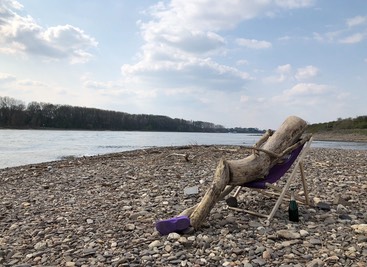
Social distancing on a Rhein sandbank near our village
One trick is to do something different each day to remind you that you’re human and have a creative soul that needs to be fed and nourished. And it’s okay to say ‘no’ to some things sometimes. Take care you made it through another week like everyone else. Stay safely at home, as all things will pass.
May 11
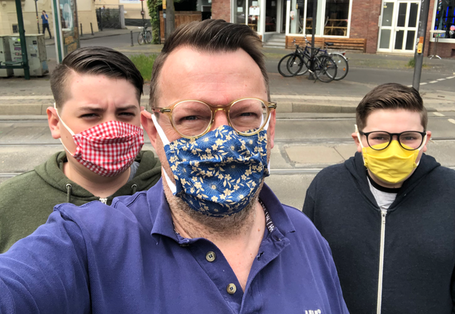
First there is a furtive glance, eyes meet as you look each other up and down
in a doorway or lift entrance. There is a brief acknowledgement, a sigh of
relief and you move quickly on. The momentary vibe is slightly sinister, like London’s
late-90s Soho when night hawks and gangsters crossed paths at 5am. But it’s
after noon, the sun is streaming, and in I’m in the centre of Bonn, once the capital
of West Germany and seat of the re-unified German Government until 1999.
Some of the city is open, but all major events remain cancelled and some smaller ones, including the annual cherry blossom festival. The old town turns an amazing shade of pink for about 10 days. People from all round the world travel to see this ad-hoc neighbourhood managed street festival. It’s the spirit of Bonn. Friendly, open to all and utterly beautiful. This year, the trees bloomed, and sadly the pink petals lay on the cobble stones only seen by those who live on the street.

“It’s good to see you again, you’re well and with some small changes we are
open. It’s good to open the doors, feel the air. People are nervous but they
are starting to come out.” This is the first conversation I have had with a
human being who isn’t a family member since the end of February. And it’s with
my barber, a cheery chap with a smile and wit that’s as sharp as his razor.
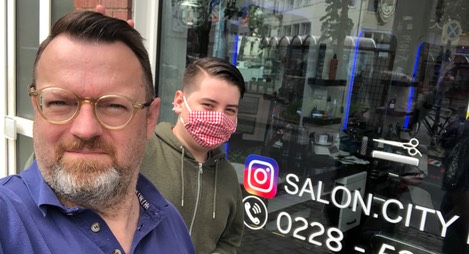
Some elements of our lockdown have been lifted, and as well as two families
being able to meet for the first time in 12 or 13 weeks in person, barbers
shops and hair salons are back in business; and shops up to 800m3 –
but we must follow strict rules.
A small number of people are out – about half the spaces are taken in the auto park
platz – and people move quickly between locations, darting across roads or in
or out of shops. They move fast and so focused it’s like they’re taking refuge
from a sniper. We do this all while wearing face masks in public. At all times.
It’s the law.
It’s a small price to pay for our limited freedom and, after just over three
months of solitude, it’s great to see the city again. Even for a brief moment.
If you’re hungry, restaurants and coffee bars can only serve take out and it’s
strictly three customers at a time only. You must remain 2.0 metres apart and
you’re served from behind a giant clear plastic screen. I guess this is what
it’s like visiting people in jail, but it’s all done with a smile and we all
know why we’re doing it. For now, this is our daily life and how we must live
in future.
Rolling on a River
Our youngest – in her final year of primary school – returned to school for two
days this week, then daily next week. Children sit at desks spaced 2.0 metres
apart across almost empty classrooms, while the school day has been halved. Children
were briefed by their teacher via WebEx a week in advance. If they have even so
much as a sniff of a cold, they stay at home.
Parents and children have been nervous about the return, but
we were relieved it was a success – the walk to school, socially distant
interactions with friends and the adapting to new ways of learning. It gets complicated next week as additional
classes return or a rotation basis. We’re going to be taking a deep breath as –
with four children – we have work out who is doing what, when and where. With a
little luck and some questioning via WhatsApp, we’ll get there.
One of our other children has been given the option of returning to school this
week but as her journey was on the school bus for 40 minutes we have opted to
hold her back for another week. The alternative is for her to cycle along the
Rhein, jump on a ferry boat that crosses over to Bonn, then continue her
journey. I wonder what her old school friends in Carshalton would think of her
ride to school..?
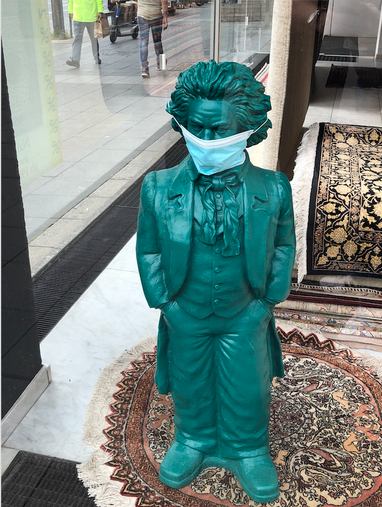
This little chap is Beethoven. He was born in Bonn and is 250 years old this year.
Who Are You?
While it was wonderful to see all the V.E. Day front garden tea parties this
week via online world, the German response was muted. It’s not because of
COVID-19, but Germany wasn’t liberated until 3 October 1990, when the Federal
Republic of Germany (West Germany) and the German Democratic Republic (East
Germany) existed a single German state since 1945 for the first time. The
country lived under dictatorship in one form or other from 1926-1995.
After living here for almost six years, I understand. The post-war story
continues and will do for another generation. Today something like one-in-four Germans
have no real idea who they are as they were found in prams left in doorways of
crumbled buildings or were found in basements in pulverised cities. With no
infrastructure, they were assisted by either the Red Cross or churches.
Still today, occasionally you see posters in the post office with a small black
and white photo and a brief story under the headline “Who am I?”, as elderly
parents still search for children or family they were separated from at the end
of the war.
The Red Cross’s Information and Documentation Centre in
Munich adds new inquiries to its 37 million non-computerised cards of 21
million names. The searches spread as far as Hungary, Russia and Poland to its
fellow associations, assisting those who escaped or driven from oppressed lands.
So if you meet “Hans Markkleeberg” or a “Hilda von Rheindorf”, there’s a good
chance they were given a new surname by a nurse or Red Cross worker. As
toddlers too young to know their full name, where they were from and with no
chance of finding relatives, their new surname reflected where they were found
– Hans may be from an area in Leipzig and Hilda was found in a Rhein village. This
formed the description that was posted on church doors or at Mayorial offices.
Germany Unity Day, 3 October, is when the country remembers all those who
have died in war and under brutality in Germany and elsewhere. While it’s been
a quieter calmer week with a pause for reflection, we’re happy, healthy and
meeting the challenge. Stay safe and don’t forget to smile as all this will
pass!
May 3, 2020
This week has mainly involved witches, fire walking, Geordies and love is all around us…
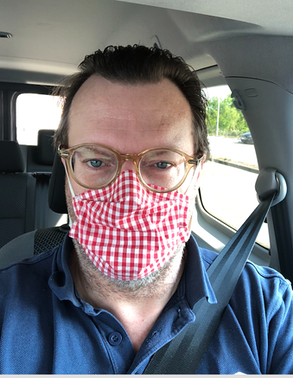
So, hands up if you learned Mandarin, mastered the fine art
of soda bread baking or taught your children to play the tuba last week? No? Me
neither.
Life is slowly turning into a weird episode of Big Brother. The only thing missing is Paul Oakenfold and Andy Gray’s “Tast-e” blasting out and a cheery Geordie voice telling you it’s day 75. The current mood of house mates is ‘grim’ and I’m awaiting to be told what the challenge is for today – most likely correcting a computing ID10t issue or logistics problem.
My mental health has taken something of a battering over the last 10 days, but it’s got better. I live with bi-polar, a rather horrible form of depressive mental illness that occasionally kicks my butt. Thankfully, I’ve got some good people I can call on. Any time. One is a fellow sufferer like me who sympathises, while the other is a professional. Mostly, it can be dealt with by taking a long walk, exercise or ‘getting away from stuff’ for a few hours, but it’s difficult if you’re on lockdown. I’m lucky to have a river walk nearby, but it’s harder for others if you’re stuck in a small apartment.
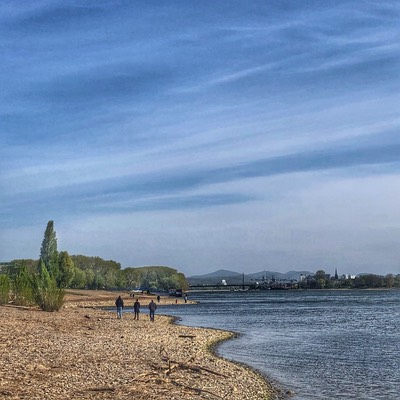
It’s Good to Talk
We’re reading about pandemic pivots where companies fundamentally change their business
approach to survive. While we may not be a car company making ventilators or fashion
house creating PPE kit for frontline workers, without noticing it, we’re all
doing the same thing.
The switch time is swift and can be a good thing, but our collective mental health is rather slow on the take-up. A health professional likened her current case load to grieve-management. So many people need closure, to move on and know “what’s next”, but they can’t as there are no answers to all the questions being thrown at them, nor can they leave the house.
For the last couple of Saturday nights, our Zoom call with friends has included a very real ‘are you okay’ with each one opening up on how we’re dealing with lockdown. Some were doing isolation bike rides, home DIY projects, or just taken the dog for a slightly longer daily walk. Everyone has their own way of dealing with isolation but if you think ‘I’m not okay’, you probably aren’t and it’s a good idea to talk to a friend, your doc or a professional.
Back to School
For us, this week has seen final year students return to school, and mandatory wearing
of face masks in public at all times, including when you go to the bank. Small shops
are open but we’re still socially distant and can’t meet in groups. Some
factories have gone back to work, with workstations adjusted to reflect social
distancing, but we’re still a long way from life returning to ‘normal’. Interestingly, some companies in Germany are
questioning why they have an office, as they’ve worked more effectively without
that big expensive building. Is this an evolving trend? We’ll see.
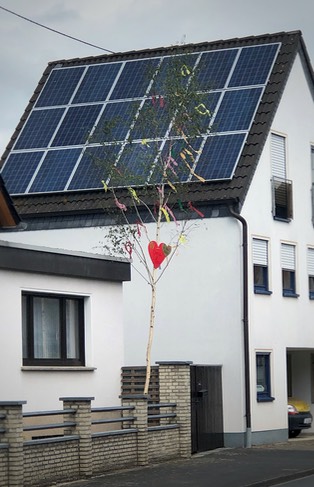
Trees Are Good
One of the annual highlights in Germany is May Day accompanied by some bizarre and
wonderful celebrations. Like in the UK, villages raise a Maibaum (May
tree) on 1st May. It’s taken very seriously here, and villages compete for
‘best’ tree, with some rival villages even going to the lengths of stealing it,
then holding the opposing town to ransom.
Our tree is usually decorated with colourful streamers and flowers, there’s a brass band, sausage-eating and copious amounts of Kolsch beer. In some parts of Germany, 31st April is known also as witches night, where you light a fire and either jump over it, or burn wooden figures on the fire to ward off any evil-doers.
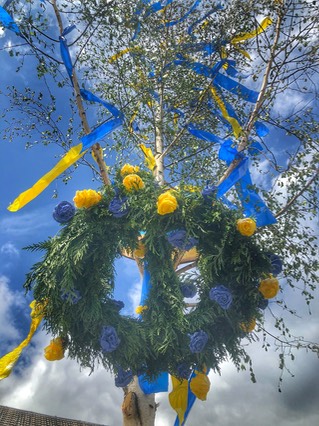
All You Need is Love
If you’re having trouble finding the courage to tell someone how much you love
them, May Day is also the perfect excuse to finally buck up and do it. Young
men or women go into the forest, chop down a young tree and place it
outside the home of their love interest, often with decorations and his or her
name on it.
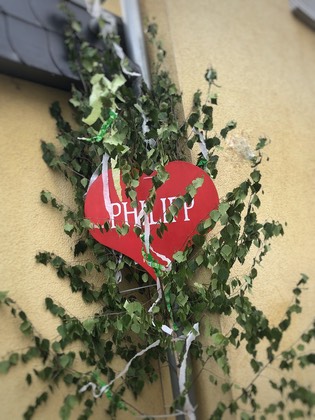
Depending on the year, it’s either the men folk, or the ladies. How much you love your other half is judged by the height of the tree, so in some places, the tree is taller than the house. It’s recycled by the family and used as firewood in the winter, so if your boyfriend turns up with a sapling, the family know he’s not of a ‘warm heart’ and definitely not a keeper.
If you don’t have a forest nearby or aren’t any good with an axe, you draw a Maistrich (May line) line of chalk between two lovers’ homes that sometimes crosses through town and ends in a heart, and/or with the pair’s names. Each one has to find the other and is wonderful to see.
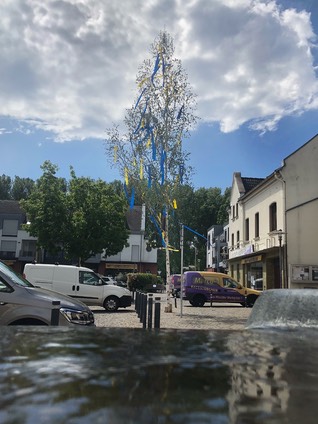
This year, the tree has been quietly decorated by a council team and put up in
the village square, while the young people and lovers have stayed 2.0-metres
apart. We’re moving into week eight of lockdown and will see what it brings,
but like everyone else in the world, we’re staying safely at home, healthy and trying
to smile each day!
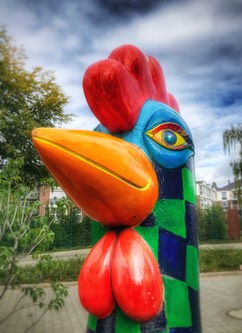
April 23, 2020
Like most people around the world, lockdown is starting to bite, and we’ve really noticed that it’s the small things that matter, whether it’s a teacup left in the sink or DIYers fitting in house remodelling around the corporate nine-to-five. If you think German holidaymakers and their early morning hotel lounger beach towel exploits are weird, try living with folk angle-grinding gate posts at 0700 before cheerfully waving at you and heading inside to work from home…
I’ve chosen to write this blog later in the week as we’ve been waiting to hear the German Federal Government’s plan for future lockdown restrictions. The announcement made late Wednesday (15 April) took some time to trickle out to us, but after a pause to reflect, light may be at the end of the tunnel. Possibly.
Schools in Germany will slowly open on May 4, starting with classes taking final exams next year, and upper primary classes. This may yet change, but the Ministers of Education and Cultural Affairs will present a concept by 29 April on how teaching can resume with special hygiene protection measures – particularly considering the need for distance through reduced learning group sizes. In addition to lesson time, breaks and school bus services will also be examined. Every school is now working with regional school authorities to create a hygiene plan and permanently ensure hygienic conditions on site.
In the meantime, the contact restrictions imposed to slow and/or stop the pandemic are to be extended generally until at least 3 May in Germany. If in a public place, we must wear also a face mask and remain a socially distant 2.0 metres apart.
The upside of the cautious relaxation of restrictions on daily life from 4 May will see shops with sales areas of up to 800 square metres reopening, but major events, such as music festivals and church gatherings, will continue to be prohibited in principle - until 31 August.
Border controls remain in place for another 20 days until 4 May and you must have a “valid reason to travel” when entering or moving around the country, but barbers and hair salons remain closed. Whereas men once asked for the Rudi Völler or Lukas Podolski when getting the latest ‘cut’, most blokes I’ve seen from afar are going for either a Paul Breitner or the full Hagrid (see mine below). Whether fuel stays at €1.00 a litre after lock down remains to be seen.

Long Good Friday
While this tiny glimmer of light on the horizon is great to see, it’s still very hard to imagine what’s happening this afternoon, let alone next month or next year. I’m starting to think about life outside when I’m released and can see the world again. Easter brought Spring weather, 20c and sunshine, so we attacked the garden with aplomb. The new veg boxes were filled with young lettuce plants and spinach seeds – and a one-meal salad harvest. Hopefully a sign of good things to come. The air was filled with the smell of barbeques and food grilling over most of the weekend, but alas, for us, due to a nationwide shortage of butane gas cannisters, we couldn’t join in as our gas bottle had run dry and none were in the shops.
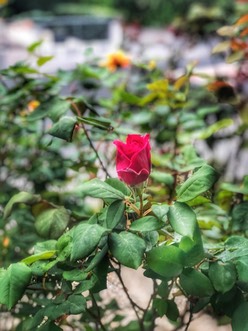
Vorsprung Durch (Küche) Technik
“You should have been here last week” is the mantra of the moment. Shop shortages are less but some noticeable gaps on shelves prevail – eggs and yeast are scarce. Calling local and larger IT firms searching for a new laptop (why does tech break just at the moment you needed it, but never in hibernation?), it seems those tech loving Germans are using lockdown time to build their own home IT networks and invest in gadgets as computers are also in short supply.
If you have some time (???) go on the Tchibo website and be amazed at the culinary gadget aids that solve problems you never thought you had in your German kitchen, from asparagus and mozzarella peelers to vegetable storage towers. For those not in the know, Tchibo is a German chain of coffee retailers and cafés known more for its range of non-coffee and slightly strange products that change weekly. Toilet paper is also back (one pack per customer) in small quantities. Our local Lidl solved the empty space issue by stacking bags of garden compost in its place. Never let it be said Germans don’t have a sense of humour.
I feel like chicken tonight…
Talking of eggs, late last year, one of our neighbours ‘invested’ in some chickens and a cockerel, and while I used to love watching TV Tom and Barbara living “The Good Life” in Surbiton, the early morning call wasn’t so welcome. After a month of early morning calls at 0530, I began dreaming up new and exciting recipes from cock-von-van (chicken hit by a van) to chicken Gordon Blau (me screaming like Gordon Ramsey as I chased it madly with a big knife).
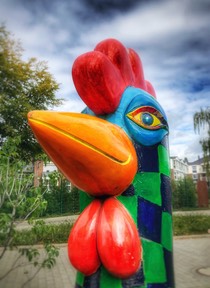
However, I’ve mellowed and come to enjoy the sound of our feathered friend in the last few days. He’s the only thing right now that’s scheduled, guaranteed and has a job for life while the rest of us are on lockdown. It’s lovely to hear him and his family rooting around feeding on bugs and food scraps, while delivering an eggy bounty for his owner.
Like most people in the UK, we’re getting some much-needed down time away from home schooling and keeping corporate lives afloat at the same time, while also stimulating and maintaining personal networks. The Lockdown Dad wood shop home electronics project continues, with an accompanying new video featuring less shonky camera work and editing – skills I learned as a teenager with VHS and Betamax video kit – and we’re also encouraging the children to join in with homemade cake-making.
More news on this and other ‘stuff’ from the bunker next week, but as we move seamlessly into week six, stay safe at home, healthy and don’t forget to smile as all this will pass!
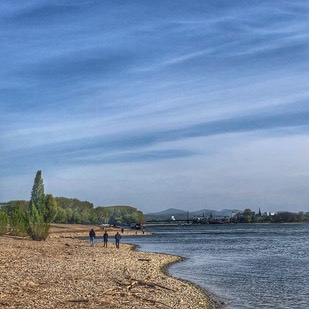
April 8th, 2020
Dual settings
Our house right now swings
between two distinctly different places. An airport departure lounge or the
set for Lord of the Flies. Time has no real meaning; people shuffle around in
comfortable clothing with no apparent hurry, it’s acceptable to drink wine or a
beer at 10:30am and destination ‘happy’ is far away on the horizon.
The second is like a third-rate rave where the volume is turned up beyond 11, everyone’s screaming the contents of their head at you all at once, and the pages of the rule book have been ripped up and used as toilet paper. Welcome to week one of Easter holiday.
“Nothing will change”
So, what’s changed in Germany? Not much is the answer. Shops are slowly
finding ‘normal’, but most still don’t have toilet paper and pasta also is in
short supply. Isolated exercise 2.0-metres apart is still allowed; and we can’t
meet in groups of two or more. Life – of sorts – carries on.
Like everyone, a mental and physical fatigue has kicked in after almost four weeks of running on adrenalin. The Government here has confirmed it cannot give a date for a relaxation of corona virus restrictions which will continue until April 19, so there is more to come.
WALTing
Amid all this, we came across a new phrase this week which is fast becoming
an isolation mantra. “We Are Learning To" (WALT) I guess comes from home
schooling but has evolved into a skill-idea swap between isolated parents or
friends.
WALT covers everything from highlighting Pinterest recipes, sharing DIY tips skills by Skype or as social media watch parties. One thing for sure is some of the ‘we’re all at home together’ fun has gone. With this is the potential to impact mental health as cabin fever takes hold.
The strains are very real, so the video conference tech the office forced on most of us and never used is now connecting people over a virtual beer or three on a Saturday night to unwind. After our vBeers night out from our basement, we got told off on Sunday by teenagers that our music was too loud, we went to bed late and were then questioned about our drinking habits.
We’ve found, tech is also a way for children to explore and learn. If you’re looking for something for them to do in the back garden, try Picture Partnership’s Photo Bingo. The team in Shirley, Croydon, has created a fun photo challenge anyone can do with a digital camera or smart phone. Take a look!
Food, Glorious Food
To contain some cabin fever, we’ve created a holiday schedule that – while is a
little more relaxed – enables our four children to use up some energy and get
involved in the house. Each evening a different child helps prepare and cook
dinner, then gives an overview of ingredients, how it’s cooked and a history of
the dish, like a chef or waiter explaining a restaurant menu.
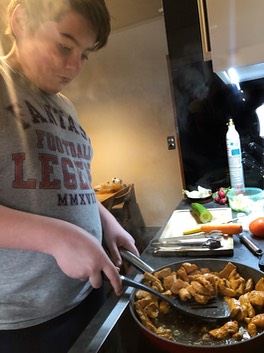
The upside is they’re trying new food – including vegetables – and discovering a world beyond curry ketchup. I’m secretly thrilled you can hide tomatoes in sweet and sour sauce and they’re a great help when you’re creating 128 meals a week over three daily sittings.
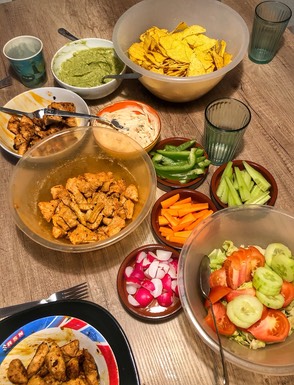
My fun WALT fact of the week: Black
Forest gateau isn’t from the Baden-Württemberg Black Forest region in south
west Germany, but a little closer to home for us. The seventies dinner-party
favourite was created by pastry chef Josef
Keller in Bad Godesberg, Bonn at his restaurant in 1915.
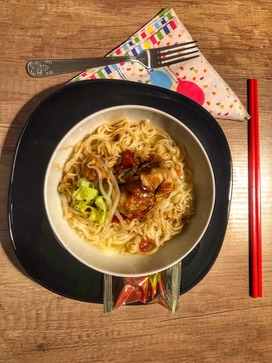
The multiple layers of chocolate sponge
cake, whipped cream and cherries inspired Keller to make a cake similar to hats
he saw ladies wearing in the Black Forest while he was on holiday. Whether he
had also prawn cocktail and washed it down with Mateus Rose in a basket remains
to be seen.
Kraftwerk
The downside of all this tech is the remote IT support elderly parents I’m
called to offer. I’ve realised everything app/tap screen related is as much
good as a chocolate teapot if you’re 76, have arthritis and only know basic
word processing. At times, I’ve used a webcam held by my Dad to view a computer
screen via Skype in the UK while I’ve ‘walked’ my Mum through issues from
Germany. I’ll never look at IT support teams in the same way again as a result.
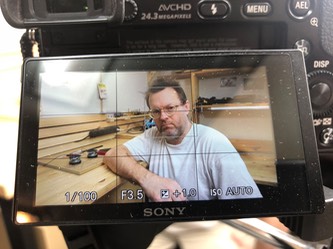
To widen my skill base while I’m off, I’ve started also to explore the world of YouTube as a basement influencer with the children, using a home electronics project as the basis for a short experiment. I got the teenage gamer of the house to record what I did on an iPhone, then used a free online video edit software to make 3-minute WALT show following how we make a Bluetooth speaker. It’s been fun and I’m passing on also editing skills I learned 30 years ago to my son.
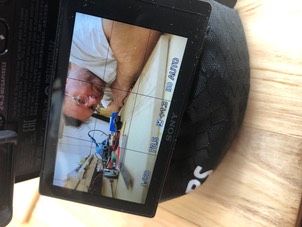
Isn’t it funny how the worthless ‘junk’ in Dad’s magic box in the garage and cub scout skills suddenly become useful? As we move into week five, stay safe at home, healthy and don’t forget to smile as all this will pass!
April 2
Grand Design
The week Lockdown Dad tackles home schooling four kids with massive power tools, British prisoners of war and toilet roll in Germany…
For years I’ve complained to my wife about the subjects our children have been taught at school. Does anyone have any idea what citizenship studies are, or what use a learning journal is later in life? Me neither. Answers on a postcard…
The lockdown in Germany has given us both the time to contemplate this, and for me to ‘adjust’ the curriculum a bit so our children are not just model citizens but equipped also to deal with daily life.
During regular school hours, there’s the usual maths, French, German, Englisch (!) and sciences, but after a socially acceptable walk in groups of no-more than two, we’re trying something different in the afternoons.
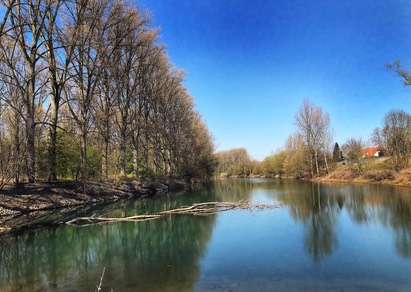
With spring starting to blossom all around us, I’m starting to prepare the garden for summer. To offset some of the cost and possible future food availability issues, we’re expanding our veg boxes in the garden.
My biggest gripe with education globally is that children are not taught design. It’s useful for all matter of things from planning furniture in a room or garden patio, to understanding how ‘stuff’ works.
If you have a rudimentary understanding of design, your house renovation costs are slashed when buying a kitchen, car maintenance bills fall, and life is a bit easier all round.
Bringing, maths and design together in a practical way, I’m working with both my daughters to build the veg boxes – measuring the plot in the garden, working out how much earth we need to fill them (volume) and ensuring they’re built correctly (90 and 45 angles). Practically, my girls now know how to use a drill, 1,500 watt mitre saw, the difference between nails, screws and coach bolts; and found new ways of problem solving.
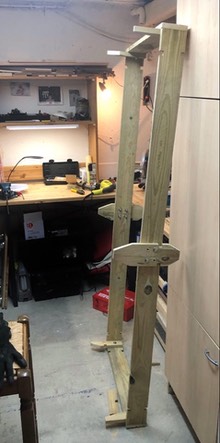
Rosie the Riveter is now Natalia the Nailer and our girls may just be better citizens for this.
We also had fun, mainly at my expense. Having built the first veg box in my basement wood shop, I discovered it was too big to go up the stairs. After some struggling, the box is now in the garden and affectionately known as Colditz. The associated history lesson highlighted how British POWs in Schloss Colditz in WW2 built a wooden glider in the castle attic as a means of escape. Not sure the neighbours would appreciate the name of the design…
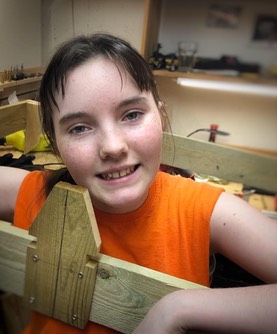
While the glider never flew, our build is complete, and the next stage is being planned – practical biology with lettuce, spinach and tomato seeds. We’re also chucking six old spuds in the garden left over from shopping last week.
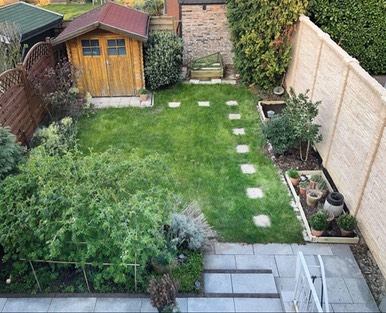
On that subject, I’ll leave you this thought. All those people panic buying toilet paper are in fact closet gardeners who are using their two or three hundred bog rolls to grow veg. How? Take the carboard roll and fill it with dirt and place on a tray.
Plant seeds inside the roll and place on a warm sunny windowsill. Water as and when required. When plants are 100cm (4 inches) transfer to the garden at the end of April. Eat when hungry and don’t mention the…
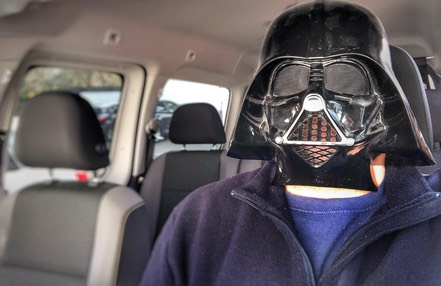
March 2020
Living on Lockdown Nine Days
In….
So, you’re on lockdown, with children and other half all sharing the same space – and dining room table. It’s day two, you’re now appreciating teachers and realising that they should be paid £500k a year. And wondering also if it’s 5pm somewhere in the world so you can enjoy a glass of wine.
Welcome to the world of isolation and joining one or two of us who are ahead of you right now in parts of the world also impacted by the virus. Like everyone, we joked about it, then the realisation hit that this is long haul and are in at the deep end without a paddle, boat or anything useful to hand. This is a bit of a long-read, but as they say in The Shawshank Redemption, ‘Time I got’..!
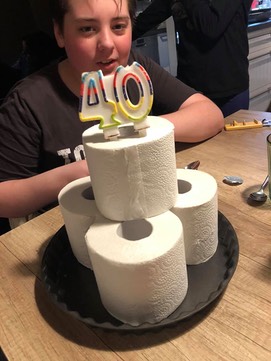
Our family live just south of Koln, Germany in a semi-rural area that’s much like Carshalton, where we used to live. We are 35 minutes from the big city but are surrounded by farmland and mountains and have the mighty Rhein flowing by a meadow five minutes from the front door. Like Carshalton, we have a wine area just south of us that’s a tiny bit bigger than Box Hill and – in normal times – our children attend the village school, play with friends and have after school clubs.
About 10 days ago, we started to get a feeling that things would change as Munich – about seven hours south of us – closed schools and banned non-essential trips. People started working from home, changing their work schedules and stopped seeing friends. We started to plan for change by fuelling the car and buying dried goods that would go in the larder for the long term.
Currently, gatherings of two or more are banned, non-essential shops are closed, restaurants can only serve take out. Tourism is closed, and only trips to hospital, doctor, place of work are allowed. Individual exercise is allowed in big open spaces two metres apart and there are no team games.
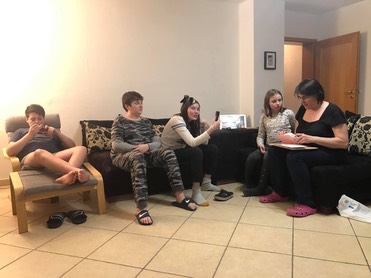
School’s Out for Summer
Friday 13 March brought excited children home at lunchtime saying they’d
been told school might close. By 1400 that day we had emails from three schools
confirming this, and also that this might be the end of the school year.
So what do you do with four children at home, don’t fully speak German and have to deal with all the associated paperwork related to Hausaufgaben – homework – plus tutors and office work? Get a bit creative and here’s how.
We’ve found that lockdown isn’t much different to being an English family living abroad, or anywhere. We’re used to change, weird stuff going on that we don’t understand and being bombarded with rules that may, or may not make a lot of sense, so only check with official government updates. Taking a chilled approach to it all is probably best.
The weekly food shop routine has changed. When we pop out on an errand, we go to a shop that is on route and buy a small number of items they have that we need. Two loaves, three milks, a bag of pasta etc. Like the rest of the world, folks bulk bought toilet paper so we’ve got creative with things we can’t find so use suppliers on eBay and Amazon. Milk and eggs are readily available at our local farm shop as well so that’s one less thing to worry about.
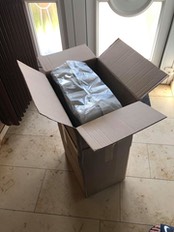
Oddly, German people bulk bought tinned mushrooms and gherkins, so if you can, please share insights on this as even the locals we know here are bemused by this…
You’ll learn that your children are flexible and will ‘get’ how stuff works faster than you. They’ll also show you ways of completing tasks with ‘handy’ (mobile) phone tech you never thought of and are a great resource. Our children are helping friends with Englisch homework via Skype in small groups which is inspiring. We’re trying to create a virtual school exchange programme so children in England learning German can communicate with kids here and learn. If this is of interest, please let me know.
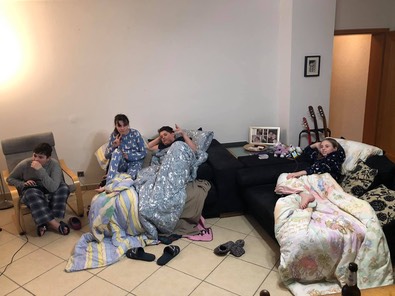
Doctor in the Haus
Technology is making things work. I’ve attended medical appointments with my
doctor three blocks away by Skype, then received a prescription emailed to me
as a PDF. I’ve then taken it to the pharmacy where they have the paper copy.
Ask your GP if they’re able to do this. Also, contactless payments and iWallets
are now the fashion, while free video conferencing apps aren’t just for work –
cyber meets, dates and parties now happen via WebEx. If you have the tech, show
your parents how to use the funny little dot on the front of their phone. Even
if it is only to show them that the cat is happy…
Yale University is running some free online lectures, so I’m updating my
professional skills while I can and do some of the free online courses I’ve
been meaning to look at for the last two years. Time is a jewel, that can be
used well!
It’s not all doom and gloom
Mental health is key for everyone from parents to children so we’re doing
different things daily with each child to stimulate them and learn new skills
in fun ways. We’re also checking in with other friends and parents over a
virtual glass of wine in the evening about schoolwork, lost textbooks, cake
recipes or just to have a laugh. Sometimes it’s at 10 am. We’re not judging.
To break the monotony, every evening, a different child is managing the cooking and using maths skills to weigh and measure ingredients, and do fractions so everyone gets an even portion – we’re also showing them how we budget each week. They’ve complained to us about the menus long enough and how it’s cooked, so now the table has turned.
Our 96-year-old neighbour who survived the war in the navy, the long walk to Koln and living in a pulverised city explained the concept of rationing to the kids in the garden and gave them a history lesson. Seeing my lawn hasn’t been cut since last year, with a glint in his eye, he highlighted a recipe people used in 1945 for grass soup. Germans have a brilliant sense of humour. Trust me!
In return we shared some of our toilet paper with them as they were struggling to find some things in the stores. Old people are living history and can share experiences with younger generation while getting some company in the open two-metres apart.
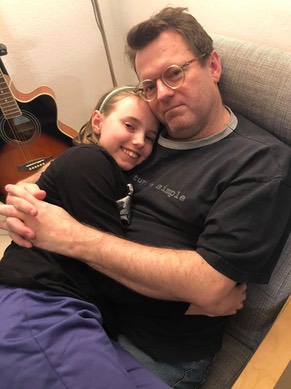
Learning can be Fun
We’re being experimental and going beyond the things they learn in the
classroom, so we’re including some life lessons. Our girls are learning how the
car works – checking the oil, lights and tyre pressures while at the local petrol
station, so in future they know where everything is on their own vehicle.
There’s light bulbs that need changing in the living room, so everyone now
knows how to do it, where the fuse box is and what to do if the power fails.
Germans love their grills, so lots of folks have dusted down their BBQ and are cooking outside – our neighbourhood smells amazing in the evenings. While it’s still a bit cold, it’s a great way to enjoy cooking a meal, then eating inside. We’re also getting out in the garden, preparing the veg boxes and starting off seedlings in old egg boxes that are now on the window ledge… starting with tomatoes, lettuce and spinach, we’ll see what happens.
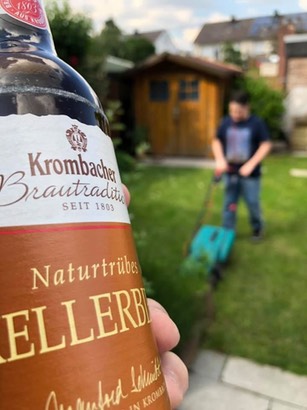
We’ve also found that Skype, Google, Zoom and Facebook Messenger are ways our children meet up to see friends. We’ve even attended a cyber birthday party with family as a way of staying connected.
If Netflix ain’t doing it and Sky Sport isn’t live, there’s a few alternatives that help battle cabin fever. Arts and cultural events were stopped here about three weeks ago, so we are looking online for entertainment.
The Berlin State Opera and Ballet is streaming nightly concerts via its website, theatres and musicians are doing this as well, so we’ve settled down together for something other than K-Pop. Tickets are usually €80 and won’t let you in wearing your pyjamas… The Royal Opera House in the UK is doing something similar via Facebook. Automotive artist Ian Cook and his Pop Bang Colour studio are running art lessons for children via Facebook, so we’ve tuned in for some of these. Look them up and try new music or events you might not normally go for while they’re free. Gardeners and ‘makers’ are also doing learning events on You Tube. One friend here is learning Japanese while another is re-trying art lessons.
The biggest thing we’ve learned after nine days in is that keeping to your usual routine as much as possible helps, and not to dwell on ‘the virus’ with the children as they sense things are wrong long before we do. We must remember to smile and keep talking to each other within our own networks, and when out and about. For some, that smile and three second glance may be the only interaction they have with the outside world as they get to post a letter.
The other is to thank the postie, bin man, doctor, teacher, supermarket shelf stacker and government employee when you see or speak with them. They were as prepared for this as you and they’ll appreciate the moral boost.
Last thing at night, I go out into the garden and listen to the spring bird song and tranquillity that is around us. We’ll miss it when we’re back in the routine, so enjoy it while it lasts. This will all pass!
Nick is the Director of Nick-Zea Smith Associates. Feel free to contact him for help with anything PR, Marketing and Brand Management-related.
Contact:
Nick Zea-Smith
Director
Nick-Zea Smith Associates
Mob: +49.17624832249
Email: nick@zeasmithassociates.com
www.zeasmithassociates.com
